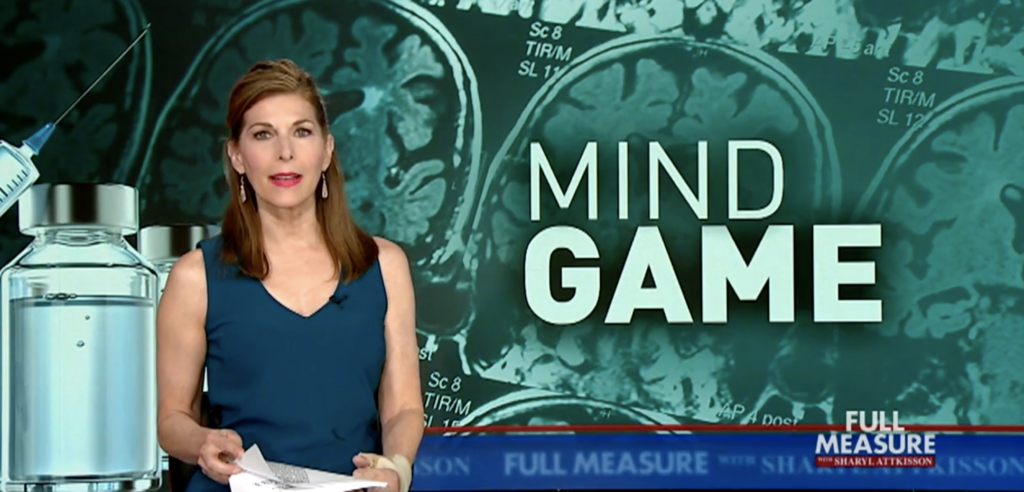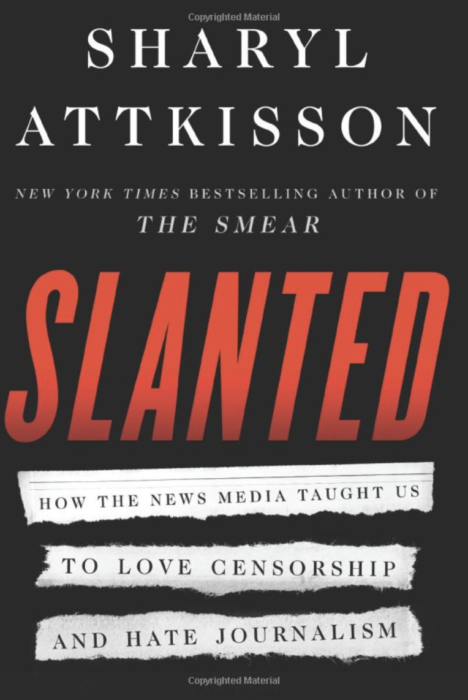
After originally defending her agency’s process, FDA acting commissioner Janet Woodcock has now requested a review of the FDA’s controversial approval of an Alzheimer’s drug.
There has been widespread criticism of last month’s approval of aducanumab sold under the brand name Aduhelm. The FDA gave the injectable medicine a green light in June even though none of its advisers recommended approving it.
Three FDA advisers resigned over the unrecommended approval.
Since then, the drug and the FDA’s approval process have been criticized by FDA advisers and medical professionals.
Amid the controversy, Woodcock has now requested the Inspector General conduct an independent review of the correspondence between the FDA and the company that makes Aduhelm: Biogen.
Watch my Full Measure investigation here. Read the transcript at the end of this post.
As I reported in my Full Measure investigation, Biogen originally ended two large studies of aducanumab midstream because results were so disappointing, the research was deemed “futile.”
However, after consulting with the FDA, the company reversed course and said that it found the drug could be effective, after all, in Alzheimer’s patients early in the course of their disease.
The FDA made a controversial joint presentation with Biogen to the FDA advisory board that considers drug safety and effectiveness. Some of the FDA advisers were extremely critical of the close collaboration between Biogen and the FDA, and said the process was biased. None of the advisers recommended approving the drug. However, the FDA approved it, anyway.
More controversy arose when the FDA said Aduhelm was approved for Alzheimer’s patients, generally. But it had never been tested in any patients other than those with mild symptoms or early-stage Alzheimer’s.
Last week, the FDA issued a clarification that the drug had never been tested in any patients with more advanced disease.
In her about-face, Woodcock has now announced: “We believe an independent assessment is the best manner in which to determine whether any interactions that occurred between the manufacturer and the agency’s review staff were inconsistent with FDA’s policies and procedures.”
The following is a transcript from my Full Measure investigation in May 2021.
It’s estimated that about six million people in the U.S. have the dreaded form of dementia known as Alzheimer’s disease. The search for a cure has fallen frustratingly short. Now, one pharmaceutical company says a cure, at least for early Alzheimer’s, is on the horizon – just waiting for FDA approval. But it’s not so simple. Today’s cover story: questions about conflicts of interest, money, and why critics say it’s a Mind Game.
70-year old Jackie Russell Racine was diagnosed with Alzheimer’s disease two years ago. Her daughter, Melissa, is now her full time caregiver.
Melissa Racine: She’s progressed pretty far in the past year. She has memory, but it’s like she’s missing the association of what things are and who we are a lot. I’ve noticed she thinks I’m her niece a lot now.
The only drugs approved to treat Alzheimer’s tackle symptoms and don’t change the progressive, fatal course of the disease.
Melissa Racine: When I started my research, it was pretty bleak, honestly. I had noticed that it’s not a new disease necessarily, it’s something they’ve known about for quite a long time and there hasn’t been that many advancements over the years in medication and just treatment-wise for people with Alzheimer’s.
But there’s new hope in the form of a shot every four weeks: a drug called aducanumab. It would be the first treatment that impacts the root cause. But it’s stirring up a hornet’s nest of controversy.
Sharyl Attkisson: So what is the question about this particular drug?
Dr. Michael Carome heads up the health research group at the watchdog Public Citizen.
Dr. Michael Carome: The concern is that first of all, that the data isn’t there to show that the drug works. The agency was on the verge of favoring approval of this drug when the evidence simply did not support that conclusion.
The controversy dates back two years. Biogen, maker of aducanumab, was conducting two large clinical studies on thousands of people.
Dr. Michael Carome: But in March of 2019, the company announced that they were stopping both of these trials because an analysis partway through this study, it’s called an interim analysis, showed that it would be “futile” to continue, meaning that if they continued the trials to their planned completion, the expected result was going to be the drugs don’t work. And so let’s not continue it because it would be futile to do so.
It was disappointing. But not, as it turns out, the end of the story. Nine months after the studies were deemed futile, Biogen reversed its stance. It said it re-examined the study data in collaboration with the FDA and determined aducanumab works, after all.
Dr. Michael Carome: And so based upon that, they said, “After consulting with the FDA, we’ve decided to go ahead and proceed with an application to the agency for approval.”
Sharyl Attkisson: How common is it, do you know, that a drug company would present findings from studies that were never finished, and try to use that to get approval of a drug?
Dr. Michael Carome: It’s uncommon, and it’s certainly uncommon for that type of evidence to be the basis for an eventual FDA approval.
Nonetheless, the FDA convened a meeting of its advisers last November to consider approving the drug for Alzheimer’s. Biogen declined our interview requests.
Biogen’s Samantha Budd Haeberlein spoke at the FDA meeting.
“Given the totality of the evidence, we can conclude that the benefit risk profile for aducanumab is favorable and potentially prolongs patients’ independence by several months, even a few years, as demonstrated in our long term study. This matters for the patients, their loved ones and society.”
But something unusual happened at the meeting. Instead of the FDA providing a separate, independent analysis like it usually does, it partnered with Biogen to present a single joint briefing document.
Speaking for the FDA: head of the Neuroscience Office Dr. Billy Dunn.
“When considered on its own, Study 302 would appear to be a home run, but we had to sort out the impact of the futility declaration.”
Carome and other critics say the government-drug company collaboration produced an oddly one-sided, positive review.
Dr. Michael Carome: And that biased review really was so striking that it led to very harsh criticism by the committee members of the way the FDA staff had handled their review of the application from Biogen.
Sharyl Attkisson: Committee members sometimes are criticized because of their close ties to the industry. But in this case, you’re saying these committee members were pretty harsh and pretty negative about the process?
Dr. Michael Carome: They were especially harsh towards the FDA. They criticized the FDA for its review, for its working collaboratively with Biogen to write these analyses. And the outcome of the analyses, they said, was one-sided, that you were cherry-picking data, that you used an approach that was statistically and scientifically inappropriate.
Dr. Scott Emerson, FDA Adviser: I was very, very, very disturbed by some of the analyses that were considered. This analysis seems to be subject to the Texas sharpshooter fallacy, a name for the joke of someone first firing a shotgun at a barn and then painting a target around the bullet holes.
Dr. Michael Carome: And it was among the harshest criticism I’ve ever seen of the agency at any prior advisory committee meeting.
Sharyl Attkisson: And what was the outcome of that meeting?
Dr. Michael Carome: It was nearly unanimous. At least 10 and perhaps with one abstention said, “There is not sufficient evidence here to justify approval of this drug.” And what the FDA needs to do is require another large, randomized placebo-controlled trial before allowing this drug to be considered for approval.
The FDA has long faced criticism from watchdogs for what’s widely seen as its too cozy relationship with the pharmaceutical industry.
Sharyl Attkisson: The FDA was under a lot of criticism a couple of decades ago for not getting drugs approved quickly enough. And members of Congress were pressing them to do a better job. And patient advocates were saying, “You need to have a better relationship maybe with the industry to help push promising therapies through faster.” Is this perhaps an outgrowth of the pressure? And, in their defense, is it sort of damned if you do damned, if you don’t?
Dr. Michael Carome: Certainly Congress has passed laws that have encouraged and promoted collaboration between agencies like the FDA and the industries they regulate. So that’s certainly part of the problem. Congress has also passed laws that have weakened the standards that FDA uses for approving drugs and medical devices. So certainly that’s part of the problem.
Carome’s group has sent a series of letters asking for investigations into what it calls the “unprecedented close collaboration” between the FDA and Biogen that “dangerously compromised the independence and objectivity of senior staff and clinical reviewers.”
In its response, the FDA insists “FDA’s interactions with sponsors [drug companies] are critically important to drug development [and] essential to set clear goals and expectationsthe absence of these interactions would dramatically delay the availability of effective drugs for patients who need them.”
While the debate continues, there’s one more factor to add to the mix. Money.
Dr. Michael Carome: They projected that the annual price that they would charge for the drug if it was approved would be about $50,000 per year. And so at 10 million patients, $50,000 a year, that would be about a half trillion dollars a year. And that could lead to extraordinary economic impacts on our healthcare system, bankrupt the Medicare program, bankrupt patients in terms of the copays that they would still need to pay. And if the drug doesn’t work, at a great cost, it leads to a lot of false hope for millions of patients and their families.
Amid the controversy, an expected FDA decision on what’s billed as a groundbreaking treatment for Alzheimer’s was put off in March.
And millions of families are waiting to learn if there’s finally real reason for hope.
Melissa Racine: And seeing what it’s done to me, and my siblings, and even my children and her other grandchildren, knowing that a cure or a treatment exists that could improve one’s life, it would mean a lot.
Sharyl (on-camera): The FDA is expected to make its final decision on whether to approve the drug in June.
Update: The FDA approved the drug after our report but has since called for an investigation amid widespread criticism.








